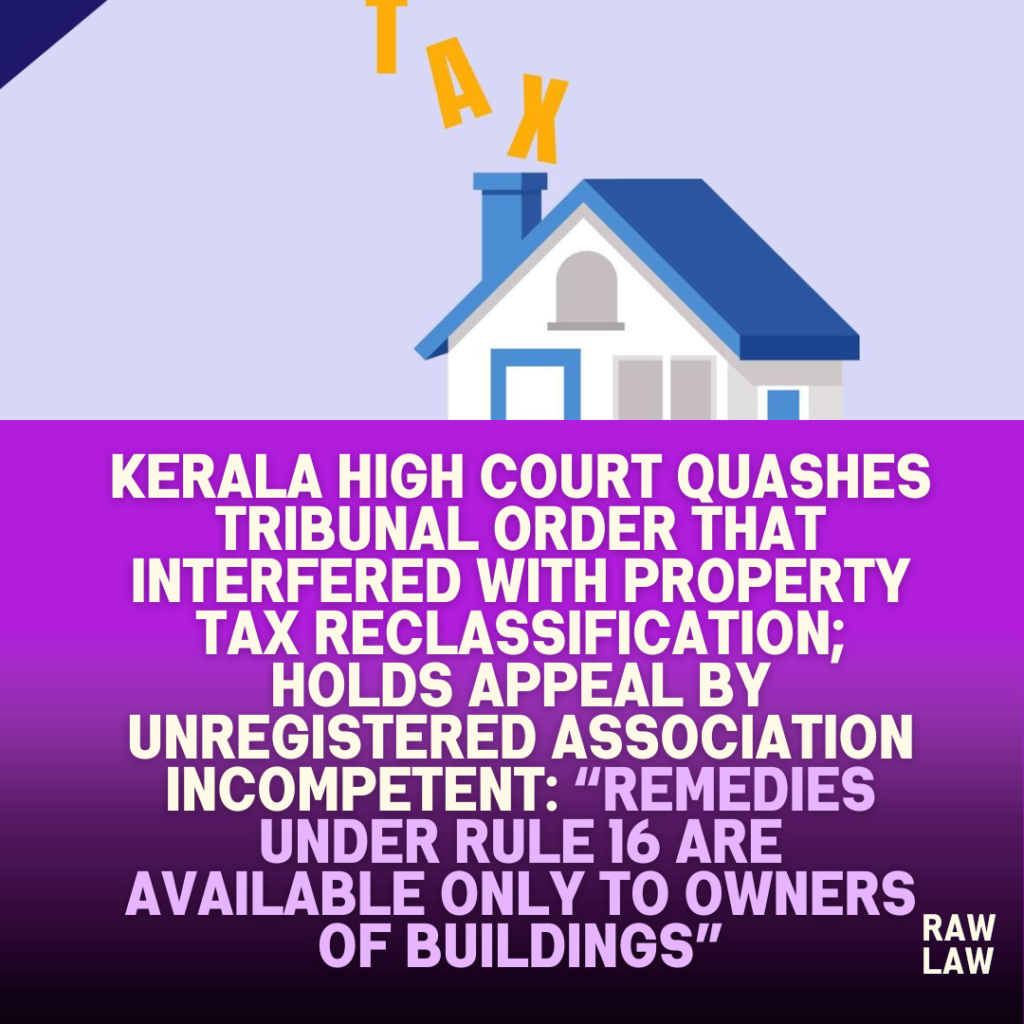Court’s Decision
The Kerala High Court allowed the writ petition filed by the Municipality and set aside the order passed by the Tribunal for Local Self-Government Institutions. The Court held that the appeal filed before the Tribunal by an unregistered association challenging the notification on property tax reclassification was incompetent and not maintainable. The Court ruled that the Tribunal erred in entertaining the matter and interfering with the notification issued by the Municipality under the Kerala Municipality (Property Tax, Service Cess and Surcharge) Rules, 2011.
Facts
The State Government issued a Government Order directing all Local Self-Government Institutions to classify areas into three zones—primary, secondary, and tertiary—and to fix property tax accordingly. The Municipality conducted a survey and classified zones, which was then published through a notification. After receiving 67 objections, the Municipality held discussions, reconsidered the classification, and issued a revised notification dated 30.03.2012 under Rule 15 of the Property Tax Rules.
The first respondent, an unregistered association, challenged this revised notification before the Tribunal. The Tribunal accepted the association’s arguments that the zone boundaries were vague and allowed the appeal, setting aside the notification and directing the Municipality to reassess and reissue the classification in accordance with the Rules.
Issues
- Whether the appeal filed by an unregistered association before the Tribunal was maintainable under Section 509(7) of the Kerala Municipality Act and Rule 16 of the Property Tax Rules, 2011?
- Whether the Tribunal was justified in interfering with the Municipality’s notification regarding zone classification and property tax determination?
Petitioner’s Arguments
The Municipality contended that:
- The appeal was not maintainable as per Rule 16 of the Property Tax Rules, which allows only individual building owners to challenge assessments, not associations.
- The term “any person” in Rule 16(7) must be interpreted in the context of objections to property tax assessments, not general grievances.
- The appeal was filed directly before the Tribunal without exhausting remedies before the Standing Committee, as required.
- On merits, the zone boundaries were clearly demarcated and notified, and the tax system had been functioning without confusion for over a decade.
Respondent’s Arguments
The respondent association argued:
- The boundaries demarcated by the Municipality were vague, with parts of the same ward placed in different zones, leading to confusion and misclassification.
- The Tribunal had jurisdiction to hear the appeal under Section 509(7) of the Kerala Municipality Act.
- The phrase “any person” under Rule 16(7) should be interpreted broadly to include associations or bodies affected by municipal decisions.
Analysis of the Law
The Court closely analyzed Section 509 of the Kerala Municipality Act and Rule 16 of the Property Tax Rules:
- Section 509(7) allows appeals to the Tribunal only in respect of matters under Sections 310 to 508, excluding taxation and finance (which fall under Sections 230 to 309).
- Rule 16 provides a detailed scheme for appeals and revisions regarding property tax assessments. The procedure requires:
- Appeals by individual building owners to the Standing Committee.
- Revisions to the Tribunal only from Standing Committee decisions.
- The Court emphasized that Rule 16 does not confer any appellate power on the Tribunal against a resolution by the Municipal Council fixing zones or tax slabs.
Precedent Analysis
Although the judgment did not explicitly rely on other cited decisions, the Court emphasized the statutory scheme laid down in the Kerala Municipality Act and the Rules, underlining that:
“Revision is not an original proceeding… Even otherwise, the 1st respondent filed an appeal and not a revision before the Tribunal.”
This approach indicates reliance on principles of administrative law and statutory interpretation over judicial precedents.
Court’s Reasoning
The Court held that:
- The Tribunal lacked jurisdiction under both Section 509(7) and Rule 16(7).
- An appeal was not maintainable before the Tribunal as taxation falls outside the scope of matters covered under Section 509(7).
- Rule 16 remedies are available only to aggrieved owners of buildings and not to associations.
- Even under Rule 16(7), only revisions are permitted against decisions by the Standing Committee—not direct appeals.
- The respondent association being unregistered further weakens its locus standi.
Hence, the Tribunal’s act of setting aside the notification and directing reassessment was ultra vires.
Conclusion
The Kerala High Court quashed the order of the Tribunal and upheld the notification issued by the Municipality. It categorically held that the appeal by the respondent association was not maintainable and that the Tribunal had overstepped its jurisdiction.
Implications
- Reinforces that only aggrieved individual property owners can seek redress against tax assessments, not associations.
- Clarifies the appellate and revisional jurisdiction under Section 509 and Rule 16 of the Kerala Municipality Rules.
- Prevents misuse of the appellate framework by non-entitled entities.
FAQs
1. Can an unregistered association file an appeal against municipal tax classification?
No. As per Rule 16 of the Kerala Municipality (Property Tax, Service Cess and Surcharge) Rules, 2011, only individual building owners are entitled to file objections or appeals.
2. Does the Tribunal for Local Self-Government Institutions have jurisdiction over tax zone classifications by Municipalities?
No. The Kerala High Court held that matters relating to taxation and finance (under Sections 230–309 of the Act) are not appealable under Section 509(7).
3. What remedy does a building owner have if aggrieved by property tax assessment?
They must first file an appeal with the Standing Committee for Finance. If dissatisfied, they may file a revision with the Tribunal, not a direct appeal.
